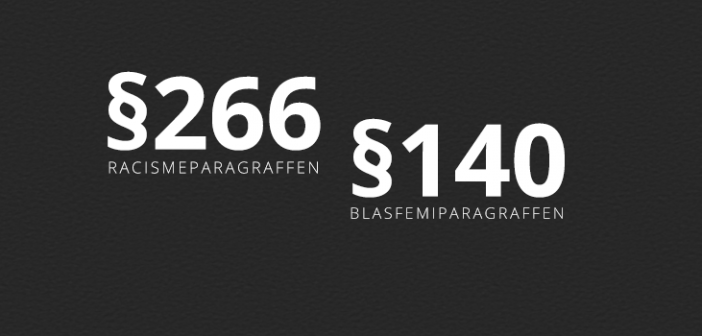In 2011, the then Minister of Justice Lars Barfoed (K) requested an opinion concerning the termination of the Penal Code § 140 (“blasphemy provision”) from the Criminal Council. According to the Terms of Reference the Criminal Law Council must assess the legal consequences, and the pros and cons of a possible repeal of the provision. Justitia has in a new research paper, published in the journal of Criminal No. 9 2014 analysed the conditions, the Criminal Law Council has been ordered to investigate, as well as on the application and development of the blasphemy provision in a historical perspective. On the basis of this the article assesses the possibilities and consequences of the possible abolition of § 140.
“The Blasphemy paragraph’s historical development shows an increasingly reluctant indictment- and judicial practice. There has only been a few incidences where the decisions were made based on §140 – latest in 1971. As the Prosecutor General, for the sake of freedom of speech, has failed to prosecute in cases where it was believed that the provision was violated. On this basis, we must conclude that it is unlikely that there will be actual legal consequences associated with a repeal of the blasphemy provision,” says CEO Jacob Mchangama, Justitia.
“Nor in Denmark’s international commitments is there any basis for maintaining a blasphemy provision. It does not conflict with freedom of speech in the European Convention on Human Rights (ECHR), but the Convention also contains no positive obligation to criminalize blasphemy. On the other hand it must be assumed that § 140 is incompatible with Article 19 of the UN Covenant on Civil and Political Rights, however, this only represents an interpretation into Danish law,” says Jacob Mchangama, Justitia.
“The question of whether the blasphemy provision should be abolished depends primarily on the legal political aspect rather than legal considerations. A con against a repeal could be argued that internationally it may be perceived as an unnecessary provocation with the risk of diplomatic crises and terrorist threats, just as it cannot be completely excluded that the blasphemy provision has a preventive effect in relation to the content of the public debate. A waiver can therefore lead to an increase in the number of coarse and insulting remarks against faiths and increased anxiety among members of religious minorities,” says CEO Jacob Mchangama.
“A pro for a repeal is that § 140 is a restriction of freedom of speech, which is a fundamental value in a democratic constitutional state. In addition, the substance of the provision is unclear, like the protection of religious feelings is incompatible with the principle of equality, since secular world-views are not covered by the same protection. The fact that the blasphemy provision is no longer enforced, is not an irrevocable guarantee that it will never be the case in the future. During the Muhammad crisis Danish lawyers expressed a desire for enforcement and strengthening of the paragraph, as well as in countries like the Netherlands and Norway there have been calls to resurrect blasphemy paragraphs. As a religious fundamentalist murdered the Dutch filmmaker Theo Van Gogh, the then Dutch Minister of Justice suggested the country’s dormant blasphemy clause should be enforced to prevent future religious violence,” Mchangama highlights.
There seems to be no empirical basis that the blasphemy clauses constitutes a preventive protection in relation to religious violence and social unrest. Internationally, it is a minority of European states and liberal democracies that still criminalize blasphemy. In most of the countries that maintain such a ban, the provisions is often used to suppress religious minorities and prevent criticism of rulers and dominant religious institutions.
“To retain a provision where the contents are no longer consistent with a society’s basic values from a potential risk that extremists will commit violence seems to be a concerning legitimization of anti-democratic values. Maintaining the blasphemy provision makes it harder to credibly criticize the blasphemy legislation and its enforcement in non-democratic countries. In a democratic society, as the Danish, the regard for fundamental freedoms should precede more pragmatic considerations. On this basis, it seems high time to repeal the Penal Code § 140,” recommends Director Jacob Mchangama, Justitia.
The article has been published in “Tidsskrift for Kriminalret”. The article is thus reproduced from Karnov Group Denmark A / S
Read the full research article in Tidsskrift for Kriminalret (in Danish)





